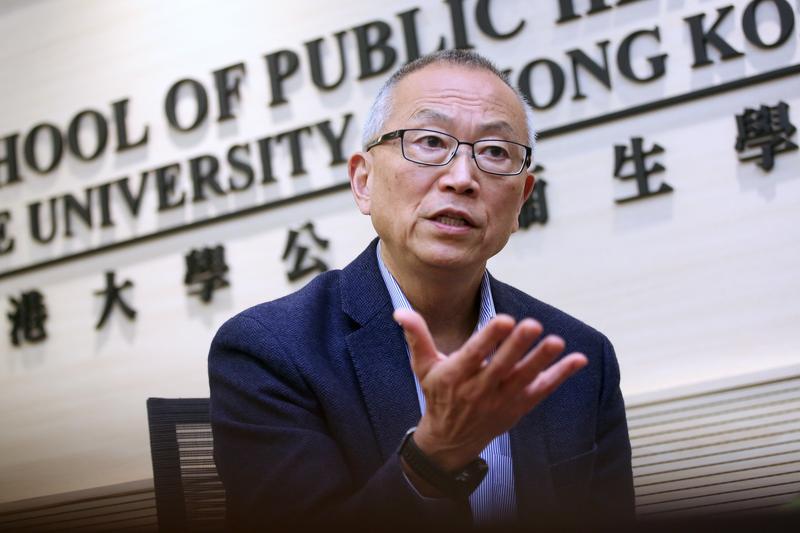 Keiji Fukuda says imported cases are unavoidable, but it is very important to keep local transmissions at a low level. (PARKER ZHENG / CHINA DAILY)
Keiji Fukuda says imported cases are unavoidable, but it is very important to keep local transmissions at a low level. (PARKER ZHENG / CHINA DAILY)
HONG KONG-Hong Kong is doing reasonably well in containing the coronavirus compared with many foreign countries, said Professor Keiji Fukuda, a leading expert on public health and epidemics. The Chinese mainland, Macao, Taiwan and Singapore are also doing quite well, he added.
But the professor warned that COVID-19 is not something that will last for just a few weeks. It may stay around for a long time. Therefore, Hong Kong people must remain vigilant and not get complacent about the coronavirus.
Fukuda is the director and a clinical professor of the University of Hong Kong’s School of Public Health, which he joined in 2016. Prior to that, he had held a number of senior positions, including the post of assistant director-general of the World Health Organization.
“Hong Kong has been struggling to bring the virus under control. It is now under reasonable control, although not under perfect control. It is not in an uncontrolled position,” he told China Daily in reference to the growing number of confirmed cases.
He said that in general, confirmed cases are classified into two categories: travel-related cases involving Hong Kong students studying abroad and Hong Kong residents holidaying in overseas countries; and local transmission cases.
He said it is pretty clear that people returning from overseas countries to Hong Kong brought the recent wave of infections into the city.
“From reading the daily epidemic curve prepared by the Centre for Health Protection, I have found that the peak period was about one to two weeks ago and then the number went down — partly because of the effects of the government’s control measures,’’ he said in an exclusive interview.
“The number went up and down but I don’t see the situation running out of control,’’ Fukuda added.
“Some of them brought infections into Hong Kong when they came back and we will put them under quarantine.
“That’s unavoidable but it is very important to keep local transmissions at a low level. You can’t aim at zero infections because that is not possible,” he explained.
There are two important steps to contain imported virus cases, he stressed. All people coming to Hong Kong must be quarantined. This signals a strong message and also acts as a buffer for Hong Kong. In addition, Hong Kong is testing a very large number people, so it is possible to find out who is infected and who is not.
Local transmissions
Discussing local transmission cases, Fukuda said there were a number of infamous cases, such as the hotpot meal cluster, the Buddhist temple in North Point cluster, the Discovery Bay hotel wedding banquet cluster and the Lan Kwai Fong and Tsim Sha Tsui pubs cluster. Yet the origins of some local transmissions could not be traced.
He said: “There are always some cases that we don’t know how the people got infected, but the overall picture is that we don’t see any explosions. Hong Kong people have in general heeded advice to wash their hands frequently, observe social distancing and avoid joining large gatherings; they are wearing masks when going out and staying home when feeling sick.
“Yet we have seen over time people have got relaxed, giving rise to new clusters of infection cases. We must guard against the virus situation by staying vigilant and careful. Otherwise, the government may need to adjust the control measures.”
Commenting on the government proposal to ban consumption of alcohol in pubs and establishments issued with liquor licences, he said there was a need to strike a balance. Fukuda said the closing anything will have consequences — such as the economic impact.
One well-known local hamburger restaurant chain from Wednesday introduced a temporary arrangement to stop eating-in services by 6 pm; after this only take-away services are available.
Fukuda does not think the government should order restaurants and cafes to reduce their operating hours. He said he likes to see cafes and restaurants open while there is no explosion of infection cases. If individual restaurants believe they can still serve customers and minimize contacts during shorter business hours, he believes this will be fine.


